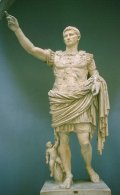
Worksheets and No Prep Teaching Resources
Reading Comprehension Worksheets
Ancient Rome

Ancient Rome
 Worksheets and No Prep Teaching Resources Reading Comprehension Worksheets Ancient Rome |
 Ancient Rome |
| edHelper's suggested reading level: | grades 9 to 11 | |
| Flesch-Kincaid grade level: | 9.11 |
|
Augustus
By Vickie Chao |

|
 1 For ancient Rome, 27 B.C. was a defining moment. That year, the Roman Republic ceased to exist. In its place, the Roman Empire was born, and Augustus was its first emperor.
1 For ancient Rome, 27 B.C. was a defining moment. That year, the Roman Republic ceased to exist. In its place, the Roman Empire was born, and Augustus was its first emperor. |
Create Weekly Reading Books
Prepare for an entire week at once! |
| Leave your feedback on Augustus (use this link if you found an error in the story) |
 |
Ancient Rome
|
 |
High School Reading Comprehensions and High School Reading Lessons
|
 |
Social Studies
|